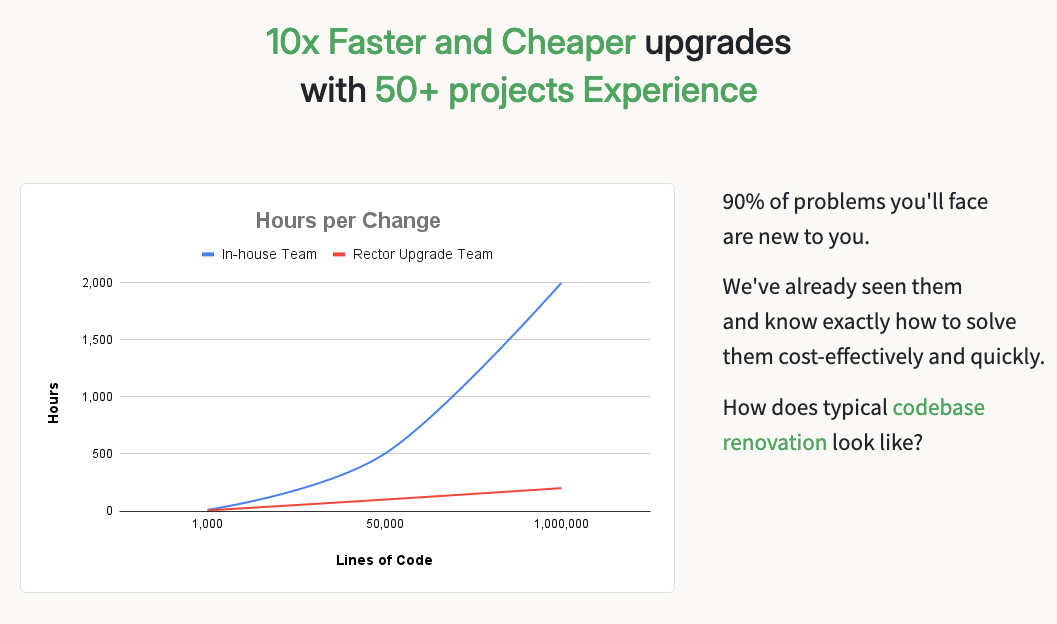Intro to RectorPHP
![php[tek] 2025](https://phptek.io/assets/images/phptek-2025.svg)

by cabbey (he/him)
20 May 2025

cabbey
Intro to cabbey
 Photo by Chris MacAskill
Photo by Chris MacAskill
Disclaimers
I'm not a member of the RectorPHP project.
I've submitted 1 patch to the project. (so far)
Intro to Awesome
Building a better world through
the power of photography.



SmugMug Films

More to come...
!(Intro to RectorPHP)
What isn't it?
- A Framework
- AI/ML/LLM!
What IS it?
A
tool
for the
automated
transformation
of
source code
via
configurable
rules.
What IS it?
A tool for the
automated
transformation of source code
via
configurable rules.
Getting Rector
Websites
- GetRector.com
- looking up rules/sets
- general docs
- github.com/rectorphp/rector
- install docs
- detailed tool usage
Install
composer require rector/rector --dev
Install (alternate approach)
Make a separate repo just to
keep all your Rector files in.
Composer install in that
repo just like normal.
Usage
- Install Rector
- Create a config file
vendor/bin/rector process path/to/code --dry-runvendor/bin/rector process path/to/code- Commit the changes
Config file
use Rector\Config\RectorConfig;
use Rector\Php83\Rector\FuncCall\RemoveGetClassGetParentClassNoArgsRector;
return RectorConfig::configure()
->withPaths([
__DIR__ . '/src',
__DIR__ . '/tests',
])
->withRules([
RemoveGetClassGetParentClassNoArgsRector::class,
]);
Configurable options
use Rector\Config\RectorConfig;
return RectorConfig::configure()
->withIndent(indentChar: ' ', indentSize: 4);
Configurable options
use Rector\Config\RectorConfig;
return RectorConfig::configure()
->withPaths([
__DIR__ . '/vendor/something/package',
])
->withDowngradeSets(php80: true);
Composer Version Detection
use Rector\Config\RectorConfig;
return RectorConfig::configure()
->withComposerBased(
twig: true,
doctrine: true,
phpunit: true,
symfony: true
);
Multiple Configurations
vendor/bin/rector --config pathTo/YourConfig.php ...
Example Run
$ vendor/bin/rector process \
--config example/uselogging-config.php \
--dry-run
1/1 [▓▓▓▓▓▓▓▓▓▓▓▓▓▓▓▓▓▓▓▓▓▓▓▓▓▓▓▓] 100%
1 file with changes
===================
1) example/UsesLogging.php:3
---------- begin diff ----------
@@ @@
declare(strict_types=1);
class UsesLogging {
- use \YeOldeLib\Log\LogAware;
+ use \Shiny\NewThing\Logging\LoggerAwareTrait;
}
----------- end diff -----------
Applied rules:
* MigrateToModernLogging
[OK] 1 file would have been changed (dry-run) by Rector
What IS it?
A tool for the
automated
transformation of source code
via
configurable rules.
What IS it?
A tool for the
automated
transformation of source code
via
configurable rules.
Intro AST
Abstract Symbol Trees
ASTs have
- nodes
- links
graph TD A[Constant: 42]
42
graph TD A[Variable: $item]
$item
graph TD A(Operator: return) -- value --> B[Variable: $results]
return $results;
graph TD A(Operator: +) -- Left --> B[Variable: $item] A(Operator: +) -- Right --> C[Constant: 42]
$item + 42
graph TD A(Operator: Assignment) -- Left --> E[Variable: $item] A(Operator: Assignment) -- Right --> B(Operator: +) B(Operator: +) -- Left --> C[Variable: $item] B(Operator: +) -- Right --> D[Constant: 42]
$item = $item + 42
graph TD A(Branch) -- Conditional --> B((Comp: ≥)) B((Comp: ≥)) -- Left --> C[Variable: $count] B((Comp: ≥)) -- Right --> D[Constant: 10] A(Branch) -- True --> E(MethodCall) A(Branch) -- False --> F(StaticCall) E(MethodCall) -- Variable --> G[Variable: $this] E(MethodCall) -- Method --> H[Identifier: doSomething] E(MethodCall) -- Argument --> I[Variable: $count] F(StaticCall) -- Class --> J[Class: Upsell] F(StaticCall) -- Method --> K[Identifier: begForMore] F(StaticCall) -- Argument --> L[empty]
if ($count >= 10) {
$this->doSomething($count);
} else {
Upsell::begForMore();
}
PhpParser\Node\Stmt\If_(
cond: PhpParser\Node\Expr\BinaryOp\GreaterOrEqual(
left: PhpParser\Node\Expr\Variable( name: "count" )
right: PhpParser\Node\Scalar\Int_( value: 10 )
)
stmts: [
0: PhpParser\Node\Stmt\Expression(
expr: PhpParser\Node\Expr\MethodCall(
var: PhpParser\Node\Expr\Variable( name: "this" )
name: PhpParser\Node\Identifier( name: "doSomething" )
args: [
0: PhpParser\Node\Arg(
name: null
value: PhpParser\Node\Expr\Variable( name: "count" )
byRef: false
unpack: false
)
]
)
)
]
elseifs: []
else: PhpParser\Node\Stmt\Else_(
stmts: [
0: PhpParser\Node\Stmt\Expression(
expr: PhpParser\Node\Expr\StaticCall(
class: PhpParser\Node\Name\FullyQualified( parts: ["Upsell"] )
name: PhpParser\Node\Identifier( name: "begForMore" )
args: []
)
)
]
)
)
That seems like a lot of code to maintain just for this project, surely it's going to be buggy!
Nope! They're leveraging the same library that PHPStan uses: PhpParser by nikic!
There are 128 OTHER contributors in the GH repo, with the #2 spot being one of the leads of RectorPHP, #3 being a php-src contributor, #4 being a lead from PHPStan, etc...
Using an AST
to change code
(a hypothetical example)
Order of Operations
- Parse the code into an AST
- Find the nodes you want to change
- Change the nodes
- Convert the AST back into code
if ($count >= 10) {
$this->doSomething($count);
} else {
Upsell::begForMore();
}
if ($count >= 10) {
$this->doSomething($count);
} else {
$this->handleSmallCarts();
}
graph TD A(Branch) -- Conditional --> B((Comp: ≥)) B((Comp: ≥)) -- Left --> C[Variable: $count] B((Comp: ≥)) -- Right --> D[Constant: 10] A(Branch) -- True --> E(MethodCall) A(Branch) -- False --> F(StaticCall) E(MethodCall) -- Variable --> G[Variable: $this] E(MethodCall) -- Method --> H[Identifier: doSomething] E(MethodCall) -- Argument --> I[Variable: $count] F(StaticCall) -- Class --> J[Class: Upsell] F(StaticCall) -- Method --> K[Identifier: begForMore] F(StaticCall) -- Argument --> L[empty]
graph TD A(Branch) -- Conditional --> B((Comp: ≥)) B((Comp: ≥)) -- Left --> C[Variable: $count] B((Comp: ≥)) -- Right --> D[Constant: 10] A(Branch) -- True --> E(MethodCall) A(Branch) -- False --> F(StaticCall) E(MethodCall) -- Variable --> G[Variable: $this] E(MethodCall) -- Method --> H[Identifier: doSomething] E(MethodCall) -- Argument --> I[Variable: $count] F(StaticCall) -- Class --> J[Class: Upsell] F(StaticCall) -- Method --> K[Identifier: begForMore] F(StaticCall) -- Argument --> L[empty] classDef ignored fill:#eee8d5,stroke:#eee8d5,edgeLabelBackground:#eee8d5; class A,B,C,D,E,G,H,I ignored;
graph TD F(StaticCall) -- Class --> J[Class: Upsell] F(StaticCall) -- Method --> K[Identifier: begForMore] F(StaticCall) -- Argument --> L[empty]
graph TD F(MethodCall) -- Class --> J[Class: Upsell] F(MethodCall) -- Method --> K[Identifier: begForMore] F(MethodCall) -- Argument --> L[empty] classDef error fill:#dc322f class J error
graph TD F(MethodCall) -- Variable --> J[Variable: $this] F(MethodCall) -- Method --> K[Identifier: handleSmallCarts] F(MethodCall) -- Argument --> L[empty]
graph TD A(Branch) -- Conditional --> B((Comp: ≥)) B((Comp: ≥)) -- Left --> C[Variable: $count] B((Comp: ≥)) -- Right --> D[Constant: 10] A(Branch) -- True --> E(MethodCall) A(Branch) -- False --> F(MethodCall) E(MethodCall) -- Variable --> G[Variable: $this] E(MethodCall) -- Method --> H[Identifier: doSomething] E(MethodCall) -- Argument --> I[Variable: $count] F(MethodCall) -- Variable --> J[Variable: $this] F(MethodCall) -- Method --> K[Identifier: handleSmallCarts] F(MethodCall) -- Argument --> L[empty] classDef ignored fill:#eee8d5,stroke:#eee8d5,edgeLabelBackground:#eee8d5; class A,B,C,D,E,G,H,I ignored;
graph TD A(Branch) -- Conditional --> B((Comp: ≥)) B((Comp: ≥)) -- Left --> C[Variable: $count] B((Comp: ≥)) -- Right --> D[Constant: 10] A(Branch) -- True --> E(MethodCall) A(Branch) -- False --> F(MethodCall) E(MethodCall) -- Variable --> G[Variable: $this] E(MethodCall) -- Method --> H[Identifier: doSomething] E(MethodCall) -- Argument --> I[Variable: $count] F(MethodCall) -- Variable --> J[Variable: $this] F(MethodCall) -- Method --> K[Identifier: handleSmallCarts] F(MethodCall) -- Argument --> L[empty]
if ($count >= 10) {
$this->doSomething($count);
} else {
$this->handleSmallCarts();
}
What IS it?
A tool for the
automated
transformation of source code
via
configurable rules.
Rules
PHP 8.3 deprecations
Calling get_class() and get_parent_class() without arguments is now deprecated.
class Example extends StdClass {
public function whoAreYou() {
- return get_class() . ' daughter of ' . get_parent_class();
+ return self::class . ' daughter of ' . parent::class;
}
}
Rector has a rule for that!
use Rector\Config\RectorConfig;
use Rector\Php83\Rector\FuncCall\RemoveGetClassGetParentClassNoArgsRector;
return RectorConfig::configure()
->withRules([
RemoveGetClassGetParentClassNoArgsRector::class,
]);
Rules need input
Occasionally you'll have a rule change that needs some input to define or control what it does.
-$value = SomeClass::OLD_CONSTANT;
-$value = SomeClass::OTHER_OLD_CONSTANT;
+$value = SomeClass::NEW_CONSTANT;
+$value = DifferentClass::NEW_CONSTANT;
Rector has a rule (and a system) for that!
use Rector\Config\RectorConfig;
use Rector\Renaming\Rector\ClassConstFetch\RenameClassConstFetchRector;
use Rector\Renaming\ValueObject\RenameClassConstFetch;
use Rector\Renaming\ValueObject\RenameClassAndConstFetch;
return RectorConfig::configure()
->withConfiguredRule(
RenameClassConstFetchRector::class,
[
new RenameClassConstFetch(
'SomeClass', 'OLD_CONSTANT', 'NEW_CONSTANT'
),
new RenameClassAndConstFetch(
'SomeClass', 'OTHER_OLD_CONSTANT',
'DifferentClass', 'NEW_CONSTANT'
),
]
);
Rector has a rule (and a system) for that!
use Rector\Config\RectorConfig;
use Rector\Renaming\Rector\ClassConstFetch\RenameClassConstFetchRector;
use Rector\Renaming\ValueObject\RenameClassConstFetch;
use Rector\Renaming\ValueObject\RenameClassAndConstFetch;
return RectorConfig::configure()
->withConfiguredRule(
RenameClassConstFetchRector::class,
[
new RenameClassConstFetch(
SomeClass::class, 'OLD_CONSTANT', 'NEW_CONSTANT'
),
new RenameClassAndConstFetch(
SomeClass::class, 'OTHER_OLD_CONSTANT',
DifferentClass::class, 'NEW_CONSTANT'
),
]
);
Code as Config FTW!
$todo = [];
$reflector = new ReflectionClass(\YeOlde\Lib\Thing::class);
foreach ($reflector->getConstants() as $const) {
$newHotness = new ReflectionClassConstant(
\Shiny\New\Thing::class,
$const->getName(),
);
$todo[] = new RenameClassAndConstFetch(
$const->getDeclaringClass()->getName(),
$const->getName(),
$newHotness->getDeclaringClass()->getName(),
$newHotness->getName()
);
}
return RectorConfig::configure()
->withConfiguredRule(
RenameClassConstFetchRector::class,
$todo
);
Code as Config FTW!
$todo = [];
$reflector = new ReflectionClass(\YeOlde\Lib\Thing::class);
$classes = [
\Shiny\New\Thing::class,
\Shiny\New\OtherThing::class,
\Shiny\New\ThirdThing::class,
];
foreach ($reflector->getConstants() as $const) {
$constString = $const->getName();
$possibleConsts = [$constString];
while ($start = strpos($constString, '_')) {
$constString = substr($constString, $start + 1);
$possibleConsts[] = $constString;
};
foreach ($classes as $class) {
foreach ($possibleConsts as $possibleConst) {
$newHotness = new ReflectionClassConstant(
$class,
$possibleConst
);
if (null !== $newHotness) {
break 2;
}
}
}
$todo[] = new RenameClassAndConstFetch(
$const->getDeclaringClass()->getName(),
$const->getName(),
$newHotness->getDeclaringClass()->getName(),
$newHotness->getName()
);
}
return RectorConfig::configure()
->withConfiguredRule(
RenameClassConstFetchRector::class,
$todo
);
Sets
Rector has pre-defined sets of rules for common tasks.
For example, the PHP_83 set includes all the rules for deprecations and new features in PHP 8.3.
use Rector\Config\RectorConfig;
use Rector\Set\ValueObject\SetList;
return RectorConfig::configure()
->withSets([SetList::PHP_83]);
Sets
Rector has pre-defined sets of rules for common tasks.
For example, the PHP_83 set includes all the rules for deprecations and new features in PHP 8.3.
use Rector\Config\RectorConfig;
use Rector\Set\ValueObject\SetList;
return RectorConfig::configure()
->withPhpSets(php83: true);
Built-in Sets
Rector ships with rules for basic PHP version migration, and for some frameworks and tools.
For example: Twig, Symfony, Doctrine, PHPUnit.
Built-in Sets
Rector also ships with rules for code quality cleanups.
PHPUnit
use Rector\Config\RectorConfig;
use Rector\PHPUnit\Set\PHPUnitSetList;
return RectorConfig::configure()
->withSets([
PHPUnitSetList::PHPUNIT_90,
]);
What is a Set list?
use Rector\Config\RectorConfig;
use Rector\PHPUnit\PHPUnit100\Rector\StmtsAwareInterface\WithConsecutiveRector;
use Rector\PHPUnit\PHPUnit90\Rector\Class_\TestListenerToHooksRector;
use Rector\PHPUnit\PHPUnit90\Rector\MethodCall\ExplicitPhpErrorApiRector;
use Rector\PHPUnit\PHPUnit90\Rector\MethodCall\SpecificAssertContainsWithoutIdentityRector;
use Rector\Renaming\Rector\MethodCall\RenameMethodRector;
use Rector\Renaming\ValueObject\MethodCallRename;
return static function (RectorConfig $rectorConfig): void {
$rectorConfig->rules([
TestListenerToHooksRector::class,
ExplicitPhpErrorApiRector::class,
SpecificAssertContainsWithoutIdentityRector::class,
WithConsecutiveRector::class,
]);
$rectorConfig->ruleWithConfiguration(
RenameMethodRector::class,
[
new MethodCallRename(
PHPUnit\Framework\TestCase::class,
'expectExceptionMessageRegExp',
'expectExceptionMessageMatches'
),
]
);
};
return static function (RectorConfig $rectorConfig): void {
$rectorConfig->sets([
PHPUnitSetList::ANNOTATIONS_TO_ATTRIBUTES
]);
$rectorConfig->rules([
StaticDataProviderClassMethodRector::class,
PublicDataProviderClassMethodRector::class,
AddProphecyTraitRector::class,
WithConsecutiveRector::class,
RemoveSetMethodsMethodCallRector::class,
PropertyExistsWithoutAssertRector::class,
ParentTestClassConstructorRector::class,
]);
$rectorConfig->ruleWithConfiguration(
RenameMethodRector::class,
[
// https://github.com/sebastianbergmann/phpunit/issues/4087
new MethodCallRename(
'PHPUnit\Framework\Assert',
'assertRegExp',
'assertMatchesRegularExpression'
),
// https://github.com/sebastianbergmann/phpunit/issues/5220
new MethodCallRename(
'PHPUnit\Framework\Assert',
'assertObjectHasAttribute',
'assertObjectHasProperty'
),
new MethodCallRename(
'PHPUnit\Framework\Assert',
'assertObjectNotHasAttribute',
'assertObjectNotHasProperty'
),
new MethodCallRename(
'PHPUnit\Framework\MockObject\Rule\InvocationOrder',
'getInvocationCount',
'numberOfInvocations'
),
// https://github.com/sebastianbergmann/phpunit/issues/4090
new MethodCallRename(
'PHPUnit\Framework\Assert',
'assertNotRegExp',
'assertDoesNotMatchRegularExpression'
),
// https://github.com/sebastianbergmann/phpunit/issues/4078
new MethodCallRename(
'PHPUnit\Framework\Assert',
'assertFileNotExists',
'assertFileDoesNotExist'
),
// https://github.com/sebastianbergmann/phpunit/issues/4081
new MethodCallRename(
'PHPUnit\Framework\Assert',
'assertFileNotIsReadable',
'assertFileIsNotReadable'
),
// https://github.com/sebastianbergmann/phpunit/issues/4072
new MethodCallRename(
'PHPUnit\Framework\Assert',
'assertDirectoryNotIsReadable',
'assertDirectoryIsNotReadable'
),
// https://github.com/sebastianbergmann/phpunit/issues/4075
new MethodCallRename(
'PHPUnit\Framework\Assert',
'assertDirectoryNotIsWritable',
'assertDirectoryIsNotWritable'
),
// https://github.com/sebastianbergmann/phpunit/issues/4069
new MethodCallRename(
'PHPUnit\Framework\Assert',
'assertDirectoryNotExists',
'assertDirectoryDoesNotExist'
),
// https://github.com/sebastianbergmann/phpunit/issues/4066
new MethodCallRename(
'PHPUnit\Framework\Assert',
'assertNotIsWritable',
'assertIsNotWritable'
),
// https://github.com/sebastianbergmann/phpunit/issues/4063
new MethodCallRename(
'PHPUnit\Framework\Assert',
'assertNotIsReadable',
'assertIsNotReadable'
),
// https://github.com/sebastianbergmann/phpunit/pull/3687
new MethodCallRename(
'PHPUnit\Framework\MockObject\MockBuilder',
'setMethods',
'onlyMethods'
),
//https://github.com/sebastianbergmann/phpunit/issues/5062
new MethodCallRename(
'PHPUnit\Framework\TestCase',
'expectDeprecationMessage',
'expectExceptionMessage'
),
new MethodCallRename(
'PHPUnit\Framework\TestCase',
'expectDeprecationMessageMatches',
'expectExceptionMessageMatches'
),
new MethodCallRename(
'PHPUnit\Framework\TestCase',
'expectNoticeMessage',
'expectExceptionMessage'
),
new MethodCallRename(
'PHPUnit\Framework\TestCase',
'expectNoticeMessageMatches',
'expectExceptionMessageMatches'
),
new MethodCallRename(
'PHPUnit\Framework\TestCase',
'expectWarningMessage',
'expectExceptionMessage'
),
new MethodCallRename(
'PHPUnit\Framework\TestCase',
'expectWarningMessageMatches',
'expectExceptionMessageMatches'
),
new MethodCallRename(
'PHPUnit\Framework\TestCase',
'expectErrorMessage',
'expectExceptionMessage'
),
new MethodCallRename(
'PHPUnit\Framework\TestCase',
'expectErrorMessageMatches',
'expectExceptionMessageMatches'
),
]);
};
Levels
Many of the sets have hundreds of changes in them.
Levels let you gradually apply those gradually.
use Rector\Config\RectorConfig;
return RectorConfig::configure()
->withPreparedSets(
typeDeclarations: true
);
use Rector\Config\RectorConfig;
return RectorConfig::configure()
//->withPreparedSets(typeDeclarations: true)
->withTypeCoverageLevel(0);
use Rector\Config\RectorConfig;
return RectorConfig::configure()
//->withPreparedSets(typeDeclarations: true)
->withTypeCoverageLevel(1);
use Rector\Config\RectorConfig;
return RectorConfig::configure()
//->withPreparedSets(typeDeclarations: true)
->withTypeCoverageLevel(2);
use Rector\Config\RectorConfig;
return RectorConfig::configure()
//->withPreparedSets(typeDeclarations: true)
->withTypeCoverageLevel(3);
use Rector\Config\RectorConfig;
return RectorConfig::configure()
//->withPreparedSets(typeDeclarations: true)
->withTypeCoverageLevel(getenv('LEVEL'));
Community Sets
Lots of community packages and projects have rector rule sets and even custom rules specifically for their users. Ex: Drupal, cakephp, CraftCMS, Laminas...
What IS it?
A tool for the
automated
transformation of source code
via
configurable rules.
What's Not To Love?!
Caveat Emptor
Finding Rules
Formatting Chaos
Use a tool to auto format your code. All of it.
Do this before and after using rector.
And probably in your commit flow.
Anything with old school mix of php and
html is going to be a headache.
Highly Opinionated Imports
You can either have full names everywhere (default) or you can have everything as short names with use.
Workaround is to leave rector set to full names and use something else to refactor them more intelligently.
I suggest PHPStorm's import refactor methods.
This may not be in their control without a fair amount of work on PHP-Parser... and whatever is being used for codegen.
namespace Project\MyComponent\SomePortion;
use Project\OtherComponent;
use Project\ThirdThing;
...
class ComponentObject {
private OtherComponent\ComponentObject $otherThingOne;
private ThirdThing\ComponentObject $otherThingTwo;
...
public function doAllTheThings() {
$this->otherThingOne->doSomething();
$this->otherThingTwo->doSomething();
}
public function doAllTheThings() {
- $this->otherThingOne->doSomething();
- $this->otherThingTwo->doSomething();
+ $this->otherThingOne->doSomethingElse();
+ $this->otherThingTwo->doSomethingElse();
}
namespace Project\MyComponent\SomePortion;
use Project\OtherComponent;
use Project\ThirdThing;
...
class ComponentObject {
private \Project\OtherComponent\ComponentObject $otherThingOne;
private \Project\ThirdThing\ComponentObject $otherThingTwo;
...
public function doAllTheThings() {
$this->otherThingOne->doSomethingElse();
$this->otherThingTwo->doSomethingElse();
}
namespace Project\MyComponent\SomePortion;
use Project\OtherComponent\ComponentObject;
use Project\ThirdThing\ComponentObject;
...
class ComponentObject {
private ComponentObject $otherThingOne;
private ComponentObject $otherThingTwo;
...
public function doAllTheThings() {
$this->otherThingOne->doSomethingElse();
$this->otherThingTwo->doSomethingElse();
}
namespace Project\MyComponent\SomePortion;
use Project\OtherComponent\ComponentObject as ProjectOtherComponentComponentObject;
use Project\ThirdThing\ComponentObject as ProjectThirdThingComponentObject;
...
class ComponentObject {
private ProjectOtherComponentComponentObject $otherThingOne;
private ProjectThirdThingComponentObject $otherThingTwo;
...
public function doAllTheThings() {
$this->otherThingOne->doSomethingElse();
$this->otherThingTwo->doSomethingElse();
}
namespace Project\MyComponent\SomePortion;
use Project\OtherComponent;
use Project\ThirdThing;
...
class ComponentObject {
private OtherComponent\ComponentObject $otherThingOne;
private ThirdThing\ComponentObject $otherThingTwo;
...
public function doAllTheThings() {
$this->otherThingOne->doSomethingElse();
$this->otherThingTwo->doSomethingElse();
}
Questionable Comments
/**
* @var string $noSoupForYou yada yada yada
*/
private string $noSoupForYou;
public function __construct($noSoupForYou) {
$this->noSoupForYou = $noSoupForYou;
}
/**
* @param string $noSoupForYou yada yada yada
*/
public function __construct(
private string $noSoupForYou,
) {
public function __construct(
/**
* yada yada yada
*/
private string $noSoupForYou,
) {
Heavy Sales Push




Path to Success
- Have Tests First
- Auto-format your code
- Refactor in small steps
- Commit Frequently
- Use other tools to clean up
- Retest at ever step
Have tests first
Unit tests, Functional tests, Regression Tests, Acceptance Tests, End-to-end Tests
The more test coverage the better!
Auto-format your code
Try to separate formatting changes
from actual code logic changes.
Refactor in small steps
Just because you're not doing the grunt work of making all the changes doesn't mean you can ignore the cognitive load of understanding what the tools are doing!
You still need to be able to think about and reason around the changes.
Commit Frequently
Otherwise, there is little point to using small steps.
Use other tools to clean up
This is just ONE tool in the toolbox...
remember you still have all the others.
But to try to keep manual and
automated changes separated!
And document how to make the
change again in the commit message.
Retest at every step
The whole point of the tests is to confirm you aren't breaking anything. So periodically run them again and confirm the results are the same.
Profit!
Thanks to:
- The Braille Institute
- Ethan Schoonover
- Reveal.js
- Mermaid
- Alena Holligan, John Congdon and Eric Van Johnson, Chris Skopec
- You! (yes, you.)
Questions?
Thoughts?
|
|